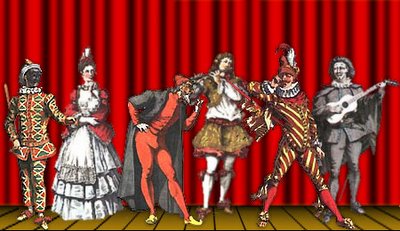
I've been reading
Possession again.
This is the only novel I've ever got to the end of only to turn straight back to the beginning without a break and read the whole thing again. Since then I've read it at least once a year since it was published, which means I must have read it at least seventeen times.
Why did I take it down again at this particular point? It's been a rough old few weeks chez Pavlov, though nowhere near as rough as it has been on my younger sister and my oldest friend, both of whom are still in the deeply painful post-operative stages of a hand reconstruction and a knee replacement respectively. It's early in life, in both cases, for osteoarthritis to have done so much damage -- and I'm next; I can feel it in my, um, well, you know.
So for me it's been a few weeks of trying to provide practical and moral support for people I love who are incapacitated, in acute pain, and in some anxiety about their futures -- while at the same time frantically catching up on work I should have done in either January, February, or the first two weeks of March, weeks that were actually spent doing big-picture work stuff while I got further and further behind with the smaller tasks, and, shamefully, losing track of what I said I would do for whom when, which of course has created brand-new problems.
So in order to be able to ignore all this stuff for at least half an hour a day, the last half-hour before the light goes out, I took down my paperback
Possession once more. I don't dare read the hardback copy again, for fear it should fall to bits. The paperback one has old creases where I've folded down corners now on every single one of its yellowing pages, where I've marked my place or a passage I wanted to keep or quote, some time over the last sixteen years.
How do I love this book? Let me count the ways.
I love the way it wears its academic depth and breadth lightly and yet without apology, and incorporates it so effortlessly into character and narrative.
I love the way it treats ideas as real, almost physical entities that exist along a contiunuum with bodies and objects in the physical world.
I love the way it plays with 19th century conventions and character, as well as with 19th century poetic modes, and the way it incorporates understanding of something the wonderful
Greg Dening once said (and that link, though it doesn't contain the quotation, is a must-read for anyone working on writing a thesis, essay, article or anything else, really) about history and the writing of historical fiction about eras when the whole cast of mind and structure of belief of human beings was more unimaginably different than we are able to grasp: 'The past is not just us dressed up in funny clothes and speaking funny speak.'
I love its geographical scope, and the passion for landscape and in-placeness with which Byatt infuses every city and landscape about which she writes -- here including Brittany, New Mexico, Yorkshire, Lincolnshire, the London that she seems to love as much and know as well as Virginia Woolf herself -- even a mythological place, the drowned city of Is.
I love the wit and humour of it, which nobody ever seems to have mentioned, but which often resides -- as with someone like, say, Henry James -- within the sentence structure itself. Byatt can laugh at academe while at the same time being passionately tied to its practices and ideals; Maud wrestling with her paper on metaphor is a very funny but also excruciating scene to everyone who's ever tried to do the same. It's also funny in its character drawing, of Leonora Stern (at her worst a parody, at her best a massively impressive character), or of Beatrice Nest, of whom much the same thing could be said, or of Fergus Wolf, who is in a way the opposite to these ladies -- superficially glittery and impressive but without much real substance, either moral or otherwise. Which leads me on to the fact that ...
I love the way the hero is a hero mainly because he is a
really nice man, a character with great sweetness of, erm, character. Roland's impulses are persistently and instinctively, unthinkingly kind-hearted. I also love the way he is rewarded for this by his epiphanic discovery that he's a poet. 'He had time to feel the strangeness of before and after; an hour ago there had been no poems, and now they came like rain and were real.'
I love the plot. Mystery, quest, chase, race and romance, brilliantly braided together.
I love Byatt's world view, which is that ideas, people and passions -- pretty much in that order -- are all important and real and infinitely detailed and complex. I love her passion for microscopic detail and the way detail matters, whether it's in the feeling between people in a moment in time, the working-out of an idea for a conference paper, or the way a jet brooch is constructed and what that says about the times in which it was made:
'Roland had never closely approached Maud's brooch, which depicted indeed a little mermaid sitting on a rock, her glossy black shoulders twisted towards the surface, modestly obviating any need to carve her little breasts. Her hair snaked down her back, and her tail snaked down the rock. The whole was enclosed in what he had taken to be twigs and now saw, through the old woman's eyes, to be branching coral.'
And most of all, I love the way she loves reading:
'Now and then there are readings which make the hairs on the neck, the non-existent pelt, stand on end and tremble, when every word burns and shines hard and clear and infinite and exact, like stones of fire, like points of stars in the dark ... Roland read as though the words were living creatures or stones of fire. He saw the tree, the fruit, the fountain, the woman, the grass, the serpent, single and multifarious in form ... and he heard the language moving around, weaving its own patterns, beyond the reach of any single human.'








